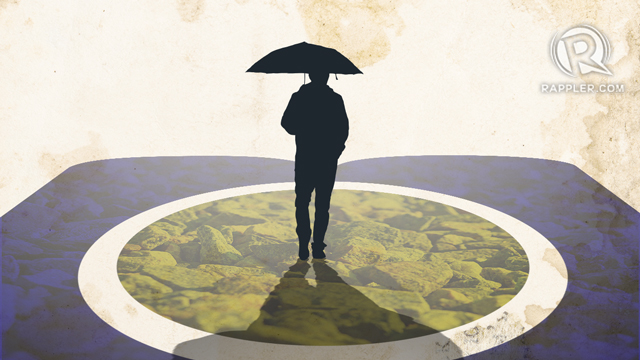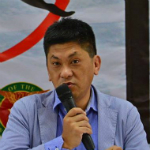
 Many years ago, I was stuck in a waiting shed in Ucab. I was then a young journalist, still unsure if I wanted to be one. It was a downpour. My shoes were sneakers, blue I think, but at that time it was brown, brown as the gooiest, sweetest melted yema you ever had. And it certainly felt that way. My shoes were coated with this heavy mixture and every step I make, I knew it will add on like I was in a field of puriket (amor seco).
Many years ago, I was stuck in a waiting shed in Ucab. I was then a young journalist, still unsure if I wanted to be one. It was a downpour. My shoes were sneakers, blue I think, but at that time it was brown, brown as the gooiest, sweetest melted yema you ever had. And it certainly felt that way. My shoes were coated with this heavy mixture and every step I make, I knew it will add on like I was in a field of puriket (amor seco).
It was almost 5 in the afternoon. I just talked to a community leader in Keystone and the talk went for hours. We didn't have beer so I wasn't in a Gene Kelly mood that rainy day. And the heavens kept on pouring. I was waiting for the last jeep out of here and I was not sure if there was one.
There was no electricity here. I said my goodbyes and I didn't want to walk. It was raining still. I had no umbrella and the brown water kept on rising.
Ucab, even then, was a wasteland. There were hardly any trees and the soil was clay. Geologists, or even the people there, will tell you there's gold in them hills because of that clayey soil. But maybe the gold had been mined out, hundreds of tons of gold ingots shipped out of the country ever since the Americans came. (IN PHOTOS: The Itogon mining community before and after Ompong)
Or even before them. I've read stories of Kadangyans eating out of gold plates and cutlery. I've read of gold spears. Even the Spaniards heard of it and they vainly and later desperately tried to come in.
But those were old times. Ucab looked like one mountain of graba (gravel). Not even – graba that had been squeezed out of its essence and just waiting to be dumped elsewhere.
Keystone was the mines of whoever married Mrs Kelly, that Thomasite who started the Bua Primary School. She tried to "civilize" the heathens and taught them life skills. Then she married a prospector who started Kelly Mines and Keystone. I didn't know what happened to Mrs Kelly.
But Keystone was the community of those who opposed the Benguet Corporation open pit mines. The mines were an eyesore in a middle of the wasteland. (READ: DENR chief orders stop to Cordillera small-scale mining after Ompong landslides)
The Keystone people wanted it stopped. It's not even a case of leave-us-the-disgusting-crumbs-we-suffered-enough. The company wouldn't budge. It was a case of dust, not gold dust, but dust that covered everything.
Why am I doing this, I asked a mangy dog in the waiting shed. We were the only living things in sight. I was telling myself, if there's a good time to leave, it was now. Leave this shit, I decided.
They thought they can grow mulberries so they can have silk. But the dust covered the mulberries and suffocated the bushes to death. And mulberries are one of the hardiest. They were thinking of growing cactus because it was a desert already. But they didn't have water to sustain cacti, imagine that. Go in summer and you'd think you're in Gobi.
But when it rained, it poured. And I was stuck here, questioning my life decision. Why did I decide to write? I was not even a mainstream journalist. I was an alternative one, writing unglamorous things. Human rights violations. Fact-finding missions to no man's land. Mining. Environmental degradation.
Well it actually paid more than being a mainstream journalist in the waning days of the Golden Age of NGOs but this was not what I signed up for.
Though it was fine. We had laptops when the others were still in typewriters and those green-screened monsters. I was holding one of those videocams with those cute cassettes. I just finished recording a community leader then it rained heavily.
Why am I doing this, I asked a mangy dog in the waiting shed. We were the only living things in sight. I was telling myself, if there's a good time to leave, it was now. Leave this shit, I decided.
Then I heard someone singing in the rain. They were children, going home from school. One of them was the daughter of my friend.
My friend had said before that he was doing this for his children, and my mind was sneering, "Corny mo (You're corny)."
The daughter was in front of me. They were singing a Salidummay song. That was from a cassette I gave them because my office produced it. When I went to Los Angeles later, I gave the Bayan chapter there a copy and they were so ecstatic.
"Nagkita kayo ken ni Daddy (You saw Daddy)?" she asked. "Wen (Yes)," I answered. "Usarem tuy payong ko (Use this umbrella)," she said. "Nasayaat ka kanu (You are a good man)," she said. Her father said.
Her father died years ago. Every day this week I looked at the list of the dead and missing and I knew no one. Maybe because it was Keystone I was searching. The Defiant Ones. (READ: In Itogon, sister volunteers to dig beneath the soil to look for brother)
I was stunned with what she said. I told myself, I'm not a good man. A sorry day in the Ucab wasteland and I was on the verge of crying.
The jeep didn't come. I walked in the rain with the borrowed umbrella and decades later, I am walking still. – Rappler.com
Frank Cimatu is a veteran journalist born, raised, and based in Baguio City.